Articles Worth Sharing
We’d like to share some of our favorite articles on the topics of assisted living, Alzheimer’s and aging.
Picking a Nursing Home Shouldn’t Be Trial and Error
By Jane E. Brody
“The important message to families: It’s not a sign of weakness — more likely a sign of strength — to move a loved one with advancing dementia to a nursing home. But it isn’t easy to find a place that offers the services and environment that the patient needs.”
Denmark’s ‘House Of Memories’ Re-Creates 1950s For Alzheimer’s Patients
By Sidsel Overgaard
“A living history museum usually conjures up images of butter churns and anvils. At Den Gamle By (The Old Town) Museum in Aarhus, Denmark, you’ll find all that. But tucked away in one corner of this museum, there’s also something different — an entire apartment straight out of the 1950s. The “House of Memories” is not usually open to the public, and it’s not aimed at schoolchildren sent to learn about a distant and exotic past. Rather, this exhibit is intended for visitors living with Alzheimer’s and other forms of dementia. And the history they’ve come to experience is their own.”
Women’s Brains Appear More Vulnerable To Alzheimer’s Than Men’s
by Jon Hamilton
“There’s new evidence suggesting that women’s brains are especially vulnerable to Alzheimer’s disease and other problems with memory and thinking.”
Julianne Moore: Alzheimer’s Makes Us Question ‘Our Essential Selves’
By NPR Staff
“‘It’s not like you have a disease and you disappear, you go away, and that’s it. There’s so many people who are living with this disease, you know, it’s a progressive disease. So it’s about how do you stay present? How do you stay with the people that you love? How do you keep the life going that you value?’”
As Aging Brain’s Internal Clock Fades, A New Timekeeper May Kick In
By Rae Ellen Bichell
“We all have a set of so-called clock genes that keep us on a 24-hour cycle. In the morning they wind us up, and at night they help us wind down. A study out Monday inProceedings of the National Academy of Sciences found that those genes might beat to a different rhythm in older folks.”
Making Sense of Alzheimer’s at School
By Jenny Brundin
“Greg goes to a private school in Denver, Graland Country Day School, which has developed a multi-subject curriculum for seventh-graders focused around dementia and Alzheimer’s disease, in part because the disease is widespread in the U.S. One in three seniors dies with Alzheimer’s or another dementia, and it can be confusing to younger generations who may not understand what’s happening to their grandparents.”
Communication Strategies
Eight tips to help you effectively communicate:
Avoid distractions. Try to find a quiet environment so that it is easier for them to focus.
Have realistic expectations. Dementia and Alzheimer’s progress with time; be aware that it will become increasingly difficult for them to understand others and to communicate in general. Remembering that everyone has good days and bad days can help keep things in perspective.
Refer to people by their names. Avoid using pronouns such as “he,” “she” and “they” during conversations. When greeting a loved one with dementia or Alzheimer’s use your first name. For example, “Hello Grandma, it’s me Jane,” is better than, “Hi, it’s me.”
Have patience. Give your loved one time to respond, including allowing them time to process what you said. Try not to let frustration get the better of you.
Speak naturally in a warm, calm tone of voice. Avoid “baby talk” or a condescending tone of voice.
Use nonverbal cues. Maintain eye contact and smile. Even if your loved one doesn’t understand everything you are saying to them, your calm demeanor will help put them at ease.
Let go of delusions or misstatements. You won’t be able to focus on what you wanted to discuss if you stop to correct statements that aren’t factual. Also, as they may have difficulty concentrating only introduce one topic of conversation.
Put yourself in their shoes. Keep in mind that if you are frustrated that they don’t seem to understand, they most likely are also frustrated when they aren’t able to communicate clearly.
Alzheimer’s By the Numbers
#1
Alzheimer’s is the most common cause of dementia
1 in 9
Americans age 65 and older have Alzheimer’s disease
32%
Of Americans age 85 and older have Alzheimer’s disease
5 Million+
Americans are living with Alzheimer’s
59%
Of caregivers reported high or very high emotional stress due to caregiving, 38% reported physical stress
15 Million+
Americans provide unpaid care for people with Alzheimer’s disease and other dementias
840,000
Projected total number of individuals age 65 or older in California with Alzheimer’s by 2025, a 37.7% increase
For more information download the 2016 Alzheimer’s Disease Fact and Figures PDF or go to alz.org/facts
Source: 2016 Alzheimer’s Disease Fact and Figures, published by the Alzheimer’s Association®
Alzheimer’s From the Perspective of a Spouse
They say that you can’t fully understand another person’s experience until you’ve walked a mile in their shoes. It can be incredibly difficult to watch as a loved one’s life is changed dramatically by dementia or Alzheimer’s disease. Seeing their behaviors and personality change over time is emotionally taxing, especially if that person is your spouse.
According to the Alzheimer’s Association more than 5 million Americans are living with Alzheimer’s. Behind each one of those individuals is a story.
Having a strong support system is incredibly important. One way to get connected and share you experiences is through ALZConnected®.
An Alzheimer’s Love Story
John shares the experience of moving his wife Kerry into an Alzheimer’s care facility.
A Marriage To Remember
In this short documentary by The New York Times filmmaker Banker White explores how his mother’s early-onset Alzheimer’s disease impacted his parent’s marriage.
Tips to Help with Sundowing

What is Sundowning?
Sundowing is when individuals with Alzheimer’s or dementia have trouble sleeping or have behavioral problems that increase beginning at dusk and continuing into the night. Studies show that at many as 20 percent of those with Alzheimer’s have more pronounced symptoms in the evening. Mental and physical exhaustion at the end of the day can lead to sundowing, but other factors can contribute. For instance, they may become disoriented and agitated at night if they have difficulty separating dreams from reality.
What to try:
- Plan outings for the morning.
- Maintain a schedule as much as possible.
- Keep dinner simple and serve the larger meal at lunch.
- Avoid stimulants in the evening, such as caffeine or sugar.
- Keep them active and awake during the day; try to limit daytime napping.
- Minimize their stress in the evening by encouraging them to choose activities that aren’t overly challenging instead of those which could lead to frustration.
- Identify triggers and limit those environmental distractions. Look for patterns of what makes their symptoms worse by keeping track of their daily activities, environments and behaviors in a notebook or in an app on your smartphone.
- Keep rooms well lit in the evenings as they can be disoriented in dimly lit rooms or frightened and confused by shadows.
- At night make sure that their room is a comfortable temperature. Being surrounded by familiar objects, such as family photos or a favorite blanket can also help put them at ease.
10 Warning Signs of Alzheimer’s

Watching the ones we love grow older is difficult.
You may notice changes in their behavior that concern you. How can you tell if what you observe is typical and age-related or if these changes indicate that they are dealing with something more serious?
The following are 10 warning signs of Alzheimer’s:
#1) Memory loss that disrupts daily life
Have they been forgetting important events or dates? Asking repetitive questions? Do you notice that they are having to increasingly rely on memory aids, such as notes or calendars?
People of all ages occasionally forget things, such as the name of an acquaintance. In contrast, forgetting notable events, such as the wedding of a family member, is a cause for concern.
#2) Difficulty with planning or solving problems
Are they having difficulty concentrating? Do they seem overwhelmed by even simple problems or straight-forward plans?
Everyone occasionally makes errors, but if they are unable to follow through with a task that in the past would have been very simple for them it could be a sign that their cognitive functions have declined.
#3) Challenged with familiar tasks
Are they unable to follow the rules of a game they have played for years? Do they have trouble driving to a familiar location? Are they unable to perform tasks that were once a part of their routine, such as paying bills or following a familiar recipe?
It is normal to have trouble with tasks that are unfamiliar, such as changing the settings on your TV, but getting lost when driving to a favorite restaurant is a problem that should be addressed right away.
#4) Confusion with time and place
Have they had experiences where they didn’t know where they were and didn’t know how they got there? Do they lose track of dates and seasons? Have you noticed that they don’t have a grasp on the passage of time?
Occasionally confusing the days of the week, such as thinking it is Wednesday when it is actually Thursday, is normal. In comparison, there is a cause for concern when someone dresses for winter when it is actually July.
#5) Trouble with visual images or spatial relationships
Are they having difficulty reading, determining color or judging distances?
While it is normal for one’s vision to decline with age, difficulty understanding visual images is a symptom of Alzheimer’s.
#6) Problems with words
Have you noticed that they repeat themselves, have difficulty finishing sentences or struggle with vocabulary? Are they having a hard time writing? Is there a noticeable decline in their ability to either follow or join a conversation?
Forgetting certain vocabulary now and then is normal, but calling things by the wrong name, such as “hand clock” instead of “watch,” is a warning sign.
#7) Losing things
Are they routinely misplacing things? Do they accuse others of stealing their possessions?
Misplacing your keys every once in awhile is normal, accusing a loved one of stealing your keys is abnormal behavior.
#8) Poor judgement
Have you noticed a trend of irrational decisions? Alzheimer’s can affect an individual’s critical thinking, causing them to make poor decisions. For example, they may give large sums of money to telemarketers or open themselves up to identity theft by providing confidential information when prompted. Have you noticed that they are paying less attention to personal grooming?
While everyone occasionally makes questionable decisions, falling for an internet scam for instance is a sign of the inability to make sound decisions.
#9) Withdrawing from social activities
Are they withdrawing from socializing? Have they stopped participating in favorite activities or engaging with their hobbies?
Sometimes social engagements can feel overwhelming, even to those who have an extroverted personality, but if someone insists on avoiding their normal social interactions you should find out why.
#10) Changes in mood or personality
Do you notice that your loved one has become confused, depressed, suspicious, anxious or fearful? Do they become upset or irritable even when they are in their comfort zone?
Changes in mood are a part of being human, but if there are noticeable changes in personality it could be a sign of an underlying cause that is more serious.
Modesto’s 2016 Walk to End Alzheimer’s
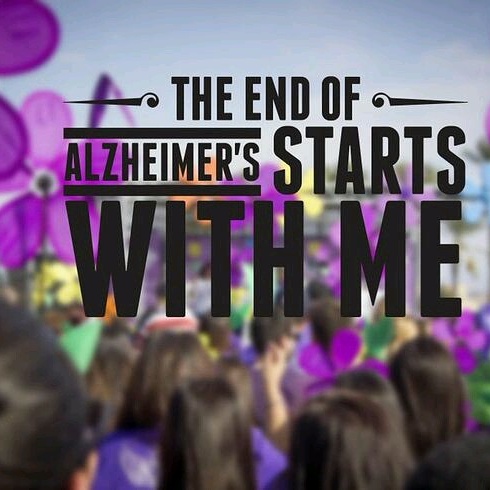
Saturday, September 10, 2016 Modesto residents will be taking a step to end Alzheimer’s. The Alzheimer’s Association Walk to End Alzheimer’s® is an annual event held across the country in more than 600 communities. It is the world’s largest event to raise awareness and funds for Alzheimer’s care, support and research.
The majority of funds raised go to Alzheimer’s care, support, research, awareness and advocacy. This includes support groups and a 24/7 helpline (800.272.3900) which offers information and referrals.
According to the Alzheimer’s Association, funds raised also go toward research for treatment, prevention and, ultimately, a cure.
- Provides more than $350 million to over 2,300 scientific proposals, creating critical advancements. Brings the global research community together to tackle common challenges, such as the first new diagnostic guidelines for Alzheimer’s in 27 years.
- Help to pass landmark legislation such as the National Alzheimer’s Project Act, which mandated a national plan to fight Alzheimer’s.
- Works to ensure federal policy reflects the urgency of the Alzheimer’s epidemic, resulting in unprecedented funding increases, including a historic $350 million increase.
- Recruits and trains hundreds of thousands of advocates to ensure that Alzheimer’s disease cannot be ignored.
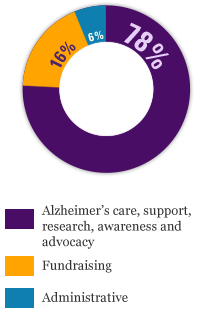
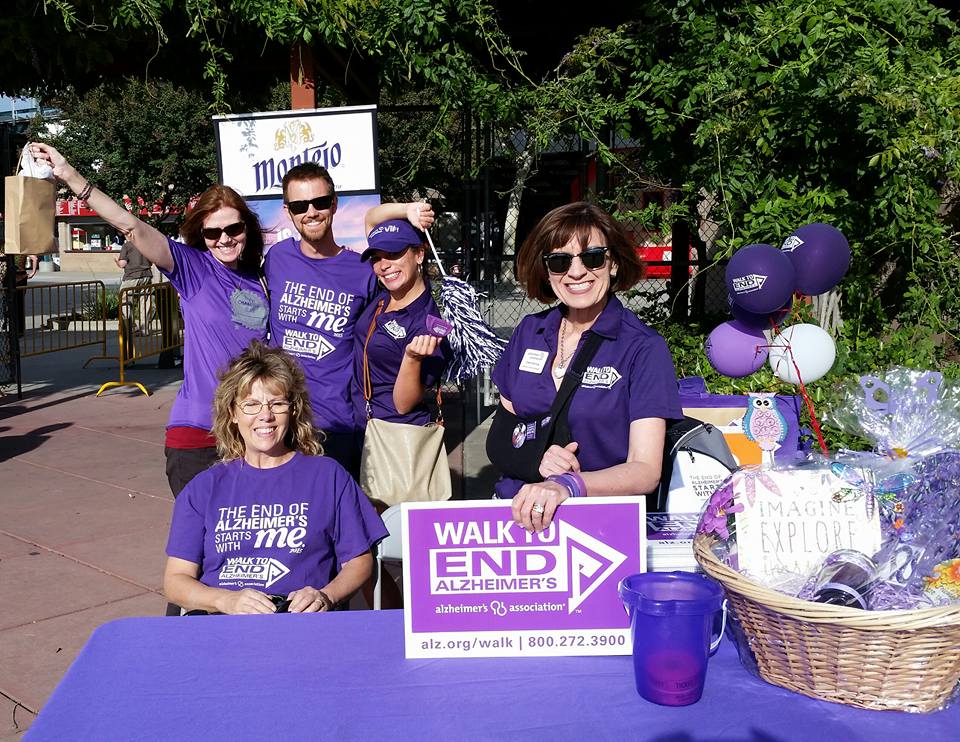

The Modesto’s 2016 Walk to End Alzheimer’s will start at Graceada Park, 401 Needham Street, Modesto. There are two options for the walk, a one mile or a three mile route. You can register as an individual or get a group together to form a team. There is no fee to register, however participants are encouraged to make a donation and participate in fundraising. Every participant who raises $100 by the day of the Walk will receive an official 2016 Walk to End Alzheimer’s t-shirt!
To register, volunteer or donate go to Modesto’s 2016 Walk to End Alzheimer’s or contact Cheryl Schrock at (209) 248-0948 or modestowalk@alz.org.
Join Modesto Walk to End Alzheimer’s Facebook group to stay up to date on what is being done locally to end Alzheimers. #ENDALZ
How to Help Them Settle In
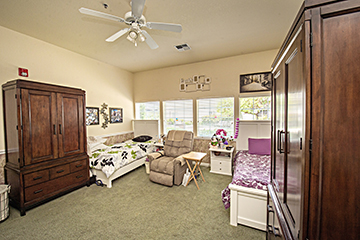
Moving is always a stressful experience and when the move is to a assisted living facility it can be an especially difficult transition.
If you are helping a parent or loved move to a care home the process can be fraught with emotion. Here are a few recommendations of how you can help make the transition as smooth as possible.
Take a Tour
In advance, take your loved one to see the room and tour the facilities. This can help them picture where they will be moving to and give them a sense of the size of the room. This also give you the opportunity to talk to both the staff and the residents. Many assisted living communities are open on weekends for visits for potential residents. To schedule a tour of Valley Comfort go to valleycomfortinc.com/contact-us or call us at (209) 544-8676.
Plan Ahead
Before the move-in date take a look at the room to see what there will be space for and what furniture will be provided. When packing, work with your loved one to identify their favorite belongings. Perhaps it is a crocheted afghan, a collection of Western novels or drawings by the grandkids. Select photographs, knick knacks and keepsakes that are important to them. These familiar items can make their room feel much more like home.
Work with the Staff
Find out ahead of time if the staff has any recommendations for move-in day. For example, ask where you should park. While this may seem like a minor detail, having a “game plan” can help keep things from getting hectic when the time comes to start moving boxes. Ask if there are items that it is recommended you do or do not bring. Also, find out who is the main “point-person,” for example, who is the best person to talk to when there are issues such as a leaky faucet.
Set Up Their Space
Help them unpack, but let them decide where to put things. Their independence is important and this is their space. Take the time to make it feel like home as much as possible, from hanging photos on the wall to putting a familiar quilt on the bed.
Show Your Support
Try to put yourself in their shoes. Think back to how you felt on the first day of school or the first day jitter you had when starting a new job. Have a positive attitude and be patient. Keep in mind that this is a major life change. It is understandable that they may have a feeling of loss, especially if they are moving out of a home where they lived for many years. If possible, stick around and share a meal that first day. Between personal and professional commitments being busy is a fact of life, but try to visit as frequently as possible.
Get Them Involved Socially
Take a look at the activities calendar. Find activities that appeal to them and get them signed up! Write things down on a calendar so they can know what they look forward to in the coming weeks. Do they love music and you see that a local choir is performing for the residents at the end of the month? Write in down on a calendar. If you know the next time you will be able to visit, add it to the calendar. While transitions can be difficult for everyone involved, showing your support can help ease the transition.
Here at Valley Comfort, we truly try to live up to our name. We try to make the settling-in transition as easy as possible for our guests. If you have any questions or concerns, please give us a call at (209) 544-8676.
June is Alzheimer’s Awareness Month!
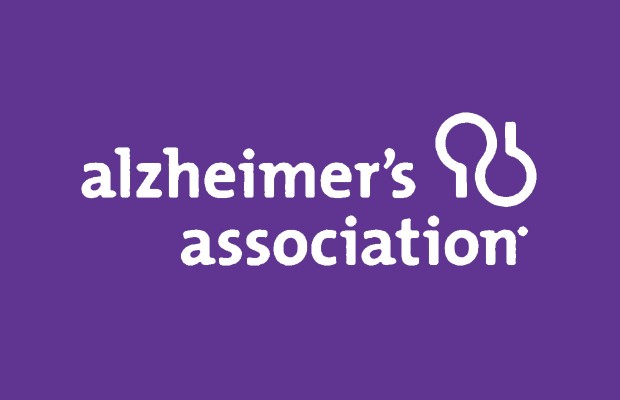
Join millions in the fight against Alzheimer’s! June is nationally recognized as Alzheimer’s & Brain Disease Awareness month. To help bring awareness, there are several different great fundraisers taking place all across the country this month to help support the research behind Alzheimer’s so we can find a cure. A great resource for information and how you can help is found on The Alzheimer’s Association website: https://www.alz.org/abam/#goPurple.
Show your support and wear purple this month! #gopurple
(Graphic by The Alzheimer’s Association, www.alz.org)
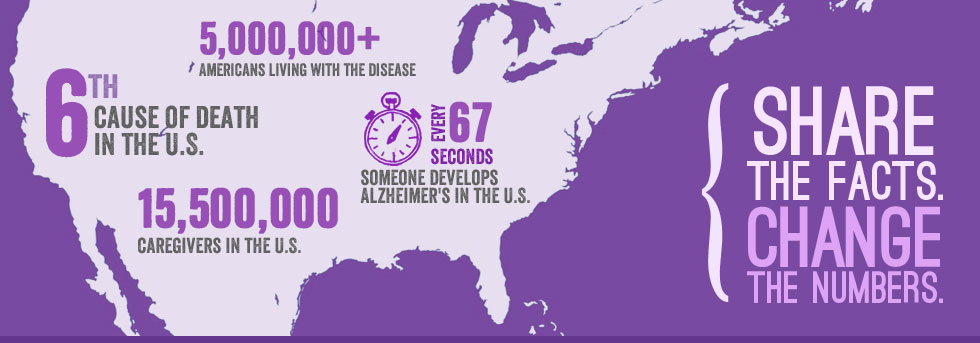
10 Ways To Keep Your Mind Sharp

As we age so does our brain. According to a study published in the New England Journal of Medicine, adults who frequently engage in mentally stimulating activities were 63% less likely to develop dementia.
Here are some ways you can keep your mind sharp:
1) Exercise
Of all the things you can do to help keep your mind young, exercise is the most important. Staying in good physical shape can help prevent some of the effects of aging. The key is to choose a fitness plan that you can stick with and do consistently.
2) Get a Good Night’s Rest
Sleep is vitally important to keeping your mind healthy and it is beneficial for your memory. According to the Division of Sleep Medicine at Harvard Medical School learning and memory has three components: acquisition, consolidation and recall. Acquisition and recall occur when you are awake, but research suggests that memory consolidation happens when you sleep. This process strengthens the neural connections that are the foundation of our memory. Getting adequate sleep at night also helps keep you alert during the day so you can make the most of daylight hours.
3) Read
Reading keeps your mind active and engaged. Also, the act of reading builds connections in the brain.
4) Write
Keep a journal. Not only is it a good exercise for your brain, it help keep memories of the day fresh. Writing also improves your ability to communicate.
5) Listen to Music
When you listen to music it has a profound effect on the brain. Music has been shown to improve cognitive and memory function.
6) Do Puzzles
Like jumping jacks for your brain, solving a puzzle is a workout for your brain. A study conducted at University of Michigan found that by playing mentally challenging games adults could dramatically improve their memory. From crossword puzzles to Sudoko to jigsaw puzzles, they are all good for your mind.
7) Sit Up Straight
When you were a kid were you always been told to sit up straight? Research shows that good posture improves circulation and blood flow to the brain.
8) Learn Something New
Experts theorize that pursuing education helps your memory as you age because it gets you into the habit of being mentally active. Challenging your mind is believed to activate processes in your brain which help maintain brain cells.
It’s never too late to pick up a new hobby, learn to speak a new language, volunteer or take a class. Many community centers and local libraries offer a variety of free classes.
9) Be Social
Both developing new relationships and deepening old ones keeps you active and your mind engaged. It is just one more reason to meet your neighbors or spend time with friends and family.
10) Shake Up Your Routines
Try doing something outside of your normal routine, such as driving by a different route or shopping at an unfamiliar grocery store. This will force you to flex your mental muscles.
If you have a parent who will be moving to a care facility it is important to consider what opportunities they will have to keep their mind active. We suggest looking for a facility that offers multiple activities throughout the week which engage residents who have a variety of interests. Here at Valley Comfort we believe in keeping our residents active. The ways we keep our residents engaged include live entertainment, regular exercise and daily actives.
